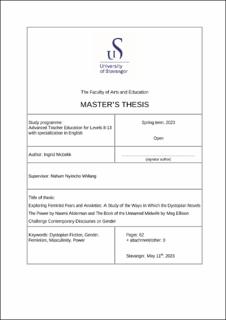| dc.description.abstract | This thesis aims to investigate how feminist writers are using the dystopian genre to express and explore feminist anxieties and fears in the contemporary society, and how these fears are used to challenge dominant discourses on gender. More specifically, it aims to study how the dystopian novels The Power by Naomi Alderman and The Book of the Unnamed Midwife by Meg Ellison, act as political commentaries that challenge and critique contemporary discourses on gender.
The novels explore feminist fears related to losing self-autonomy, as well as societies where gender wars are imminent, because of the vilification of gender. Some might argue that the feminist movement has come at a halt or even taken a step backwards, because of social issues such as the ban of abortion in US states, daily experiences of gendered prejudice, and how gender movements often are perceived as “toxic”. The novels can therefore be considered relevant to the contemporary society, as they explore themes and social issues related to gender, gender identity, gendered power structures, and equality.
The thesis first explores the manifestation of anti-feminist anxieties and its implications, which suggests that power can corrupt regardless of gender, and thus challenge the concept of gendered power. Additionally, it investigates how gender is villainized to conceal other, more prominent factors which contribute to social issues. Secondly, the thesis illustrates how double standards and hypocrisies in the contemporary society is a result of gendered prejudice. As a result, the novels critique how we treat victims and perpetrators differently depending on their gender. Lastly, the thesis explores how the novels categorize gender, and the role gender has in social dynamics and identity.
In conclusion, The Book of the Unnamed Midwife and The Power are relevant for the contemporary audience. The novels are necessary for ongoing discourses about gender and feminism because they incite a healthy and inclusive discussion about not vilifying genders, and instead working together to protect the civil liberties of everyone and live in a fairer and more equitable society. | |
